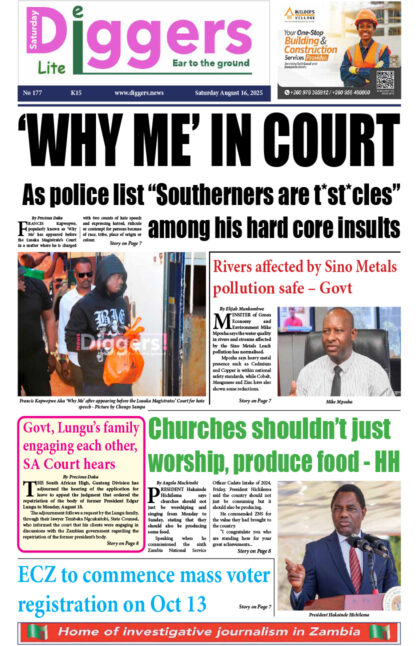ActionAid Zambia country director Nalucha Ziba has called on President Edgar Lungu to issue a White Paper, indicating his position on the recently released inquiry report into voting patterns and electoral violence of 2016.
And Ziba has insisted that the Constitution Amendment Bill No.10 should be withdrawn from Parliament to allow for fresh submissions from citizens that will incorporate recommendations contained in the violence inquiry report.
In an interview, Ziba said it would be appropriate for President Lungu and his Cabinet to inform the nation on whether or not they had accepted or rejected the report by publishing a White paper.
“That the Commission of Inquiry on electoral violence was a Commission appointed by the President, meaning that the President and his Cabinet should issue a White Paper indicating what their reaction to the findings and recommendations are, whether they have accepted or rejected them. Then during the NDF, they discussed amendments to the Constitution and Electoral Process Act without the benefit of reading this report which contains a number of recommendations bordering on the Constitution as well as the Electoral Process Act. So it is not clear what will happen now since some of the key recommendations are not in the Bill, the famous Bill 10 which was presented before Parliament. Will government be accepting new amendments at committee reading stage? Those are some of the questions that we are left with or isn’t this a good reason to withdraw the Bill and harmonize it with these recommendations? In our view, Bill 10 should be withdrawn to bring on board recommendations coming from such an expensive undertaking,” Ziba said.
And Ziba highlighted some of laws which she thinks need to be amended in order to create a peaceful atmosphere for the upcoming 2021 presidential and general elections.
“In terms of the electoral environment in 2021, there are quite a number of reforms which have to be undertaken, part of them are the electoral laws themselves but also mostly likely, it’s also around implementation and also the role of key institutions in the electoral process such as our institutions of peace and security. We expect the police to play a neutral and independent role, but in terms of how they do that, it will call for a number of reforms within the Zambia Police itself. Also, there are issues to do with the escalating political violence of which ethnicity and tribalism are a part of and looking at some of the recommendations which the report has made in terms of having regulations to regulate more especially traditional leaders around their involvement in issues of tribe and ethnicity is a welcome recommendation which we hope that it will be tabled. But also giving the Electoral Commission of Zambia a bit of teeth, where we need to be seeing it to be implementing some of the issues we see arising from the electoral which is not within what is mandated in the Electoral laws,” Ziba said.
“We tend to see a lot of political violence which is mainly orchestrated by the political parties themselves because they are the sponsors at the end of the day of the cadres we see engaging in violence and then ordinary citizens more especially the women and youth are on the receiving end. And for the young people its even worse because most them are being used as tools of violence due to the limited opportunities out there both to work as well as to engage in meaningful decent contributions. So most of them are left to take on jobs such as being cadres as a way to earn a living. So we are hoping that the role and engagement of young people in the 2021 elections will be redefined this time around and political party leadership needs to take a central stage and take leadership on this one.”
Nalucha also wondered how government could not have a budget for printing the findings of the inquiry.
“I think for government to come up with a Commission of Inquiry, it means that there was a plan for it. We are of the view that it would be prudent if this report is disseminated widely so that a number of recommendations which have come out it is incorporated in various national processes such as the Constitution, the Electoral Process Act and we also looking at the regulations around the role of traditional leadership in elections,” said Ziba.
























